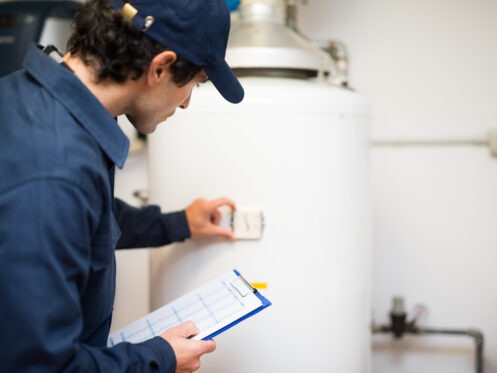The efficiency of your water heater isn’t something you probably give a lot of thought to unless you experience high water bills. Keeping an eye on its efficiency, however, is important for several reasons. As a homeowner, there are several things you can do to monitor its efficiency and even make it better.
What Is Water Heater Efficiency and Why Does It Matter?
The efficiency of your water heater determines how well it can convert energy into hot water. A common efficiency metric is the Energy Factor (EF) rating, which shows the output in terms of hot water compared to the quantity of energy that it uses. The higher the efficiency, the less energy it will use to heat water. A low efficiency rate translates into more wear and tear on the unit as well as higher water bills.
Not only does an efficient water heater keep your water bills to a minimum, but it also reduces the environmental impact of the unit. More so, higher efficiency helps ensure you will always have access to hot water when you need it most.
Hazards to Water Heater Efficiency
There are several main hazards that hinder a water heater’s ability to maintain its efficiency. Being aware of these hazards can help you know when to schedule inspections for the unit.
Sediment Buildup
One of the common factors that hurts a water heater’s efficiency is sediment buildup. Sediment accumulates over time as a result of minerals and debris building up on the bottom of the tank. The buildup does much more than reduce the amount of space for hot water to sit in the tank. It also affects the heating elements and makes the unit work harder than normal to heat the water; this translates into higher energy consumption and more expensive energy bills. If left in the tank, the sediment can cause the tank to overheat, crack, leak or even quit working completely.
Corrosion
There are many types of chemical reactions that take place inside the water heater that can lead to corrosion. This corrosion especially affects the tank’s metal surfaces and weakens the unit’s structural integrity. Corrosion on the heating elements can hinder the heat transfer process, making it difficult for the unit to keep up with your hot water demands. If the corrosion isn’t properly treated, it can cause the water heater to crack and leak, causing it to become less efficient.
High Water Temperatures
Taking a shower in hot water is really nice, but it can harm your water heater if the temperature is too high. The higher the temperature, the more standby heat loss the unit will endure. This means that heat will escape the tank even during periods of time when you’re not using hot water. The consequence of this is unnecessary energy consumption and the acceleration of sediment buildup.
Long Run Times
The more you use hot water, the more wear and tear the water heater experiences. And the more wear and tear it experiences, the less efficient it will become. This is why long, hot showers aren’t always a good thing. If your hot water distribution system is inefficient in and of itself, it can also cause inefficiencies with the hot water heater. For example, if you have long pipe runs or pipes with poor insulation, this will increase heat loss during the water transport process. As a result, the water heater will have to work harder to maintain your desired temperature.
Best Ways to Improve Water Heater Efficiency
One of the best ways to improve water heater efficiency is to keep an eye on it and schedule regular inspections. A great way to monitor the efficiency is to keep track of the unit’s energy consumption over time. Some hot water heaters even come with smart energy usage indicators that you can track on your smartphone. If you pinpoint any spikes or trends in the data, you’ll know to schedule a maintenance visit.
Lower the Water Temperature
Most water heaters have a default temperature setting of around 140 degrees Fahrenheit. Even though this is a fairly safe temperature setting, it can hurt the water heater’s efficiency. Lowering the setting to about 120 degrees will reduce standby heat loss and improve the unit’s efficiency without sacrificing comfort.
Insulate the Tank and Pipes
When you insulate the water heater and the hot water pipes, you help the unit retain heat both when it’s storing and distributing hot water. One of the easiest ways to insulate the water heater is to wrap it with an insulation blanket. There are many types available for different types of water heaters, making it simple to find one that fits yours. Insulating the water heater and hot water pipes will ensure the water stays warmer for longer as it travels through the home.
Use a Timer
Did you know that you can decide when your water heater heats the water? All you need to do is install a timer. You can tell the unit to heat water during periods of high demand, such as the mornings or evenings, and to turn off when no one is home and at night. When the unit only heats water when you need it, you can save quite a bit of money on your water and electricity bills. If the water heater runs on gas, this tip will also help save on gas costs.
Flush at Least Once a Year
Water heaters need regular flushing to remove any sediment buildup that accumulates in the tank. Having a professional flush the tank for you will ensure an effective and safe removal process that doesn’t cause any damage to the unit.
Fix Water Leaks
Water leaks in any part of your home do a lot more than just make your water bills go up. They can wreak havoc on the structural integrity of your home and even lead to mold and mildew. More so, they make the water heater less efficient by wasting water and increasing the workload on the unit. If you suspect a water leak, make sure to have it fixed as soon as possible to limit its effect on the water heater.
Install Low-Flow Showerheads and Faucet Aerators
If you haven’t upgraded your showerheads and faucet aerators to low-flow models, you need to do so right away. The low-flow models restrict water flow, meaning you’ll use less hot water. This reduces the workload on the water heater, decreasing wear and tear and boosting its efficiency.
Install Heat Traps on Hot Water Pipes
Heat traps come with valves that allow hot water to pass through the pipes when you need it. The same valves prevent the water from flowing back into the tank. This lowers heat loss and keeps the water hot until you actually need to use it.
First Choice Plumbing, Heating & Air Conditioning makes water heater maintenance and plumbing solutions easy. We also offer drain cleaning, sewer repair, boiler installations, ductless mini-split repairs and services to improve your home’s indoor air quality. Contact us now to schedule a water heater service in Metuchen, NJ.



